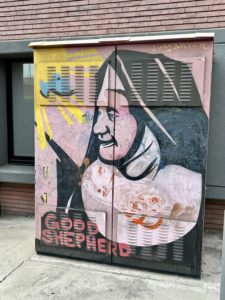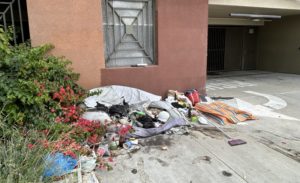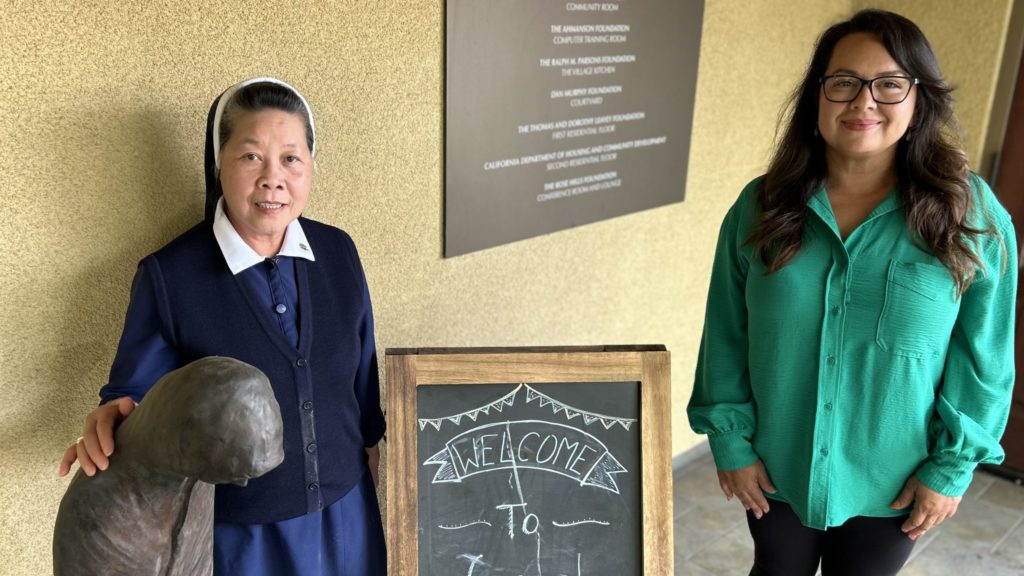The frayed silver-colored tarp wasn’t doing much to hide the makeshift mattress, collection of Big Gulp cups, or the stuffed panda bear strewn across the sidewalk in front of the Good Shepherd Center (GSC) on Beverly Boulevard.
All that clutter, GSC program director Sister Jennifer Nguyen told her staff, could make things tricky for anyone leaving the parking structure, and someone hidden amidst the encampment could be accidentally run over.
That someone would be Mike.
A 40-something Filipino man who has lived in this part of LA’s Historic Filipinotown since becoming homeless just before the pandemic, Mike gravitated to this spot a few months ago, sent out from an abandoned house across the street. He didn’t know that the Catholic Charities-run center had a history of assisting women and children in the area for the last 40 years.
Many Good Shepherd employees have gotten to know Mike, and will call 211 on his behalf for referrals to mental health resources, food assistance, or other crisis intervention. For other options, they check with the Los Angeles Homeless Service Authorities (LAHSA) or the People Assisting the Homeless (PATH).
While Mike has been receptive to the help offered, “he says he is not ready” to take up offers of public housing, according to Sister Jennifer.
Still, the idea of calling the police at the nearby Rampart Station on people like Mike doesn’t occur to the staff at GSC.
“The culture here is to never go that route, to criminalize the unhoused — that doesn’t cross our minds,” said Elvia Valdes, Good Shepherd’s associate director. “Mike is one of our neighbors. He sees us. He knows us. We engage and comfort.”

On June 28, the U.S. Supreme Court issued an opinion that makes it easier for cities to cite, fine, or arrest anyone camping in public spaces.
In a 6-3 decision, the court sided with the city of Grants Pass, Oregon, whose residents challenged elected officials to uphold laws making it illegal for homeless to sleep overnight on the street or in parks.
On that same June day, LAHSA released data showing a 2.2% decline in those identified as homeless in LA — the first drop in six years. The agency’s homeless count also reported an 18% increase in people moved off the streets and into permanent housing, reaching an all-time high of nearly 28,000 placements in the last year. It also reported a 27.6% reduction in unsheltered veterans.
A few days later, Venice-based nonprofit St. Joseph Center noted a 19% decrease in homelessness in the area it serves.
Many credit LA Mayor Karen Bass’ “Inside Safe” program for the improvement. Launched when she took office in 2022, the program escorts people from encampments into hotel rooms. It is also clearing belongings from freeway underpasses and opening up sidewalks from lines of tents.
“Enforcing laws and positions make it seem like homelessness is a problem to fix,” said Michael Donaldson, director of the Archdiocese of LA’s Office of Life, Justice and Peace. “Systems and methods are to be fixed. It doesn’t speak to the common good or seeking out ways to accompany and assist.”
When it comes to handling those living on the streets, his office and the mayor’s are “on the same page,” Donaldson said. But beyond the LA city limits, he acknowledged the Supreme Court’s decision will not prevent other cities in LA County from taking aggressive measures to remove the homeless from the streets.
Since the Cathedral of Our Lady of the Angels hosted the first Homeless Persons Interreligious Memorial in December 2022, Donaldson’s office has begun holding Homeless Ministry Resource Fairs to help connect parishes with community outreach groups like Catholic Charities and SOFESA, a nonprofit that helps homeless and low-income families and children.
Another is the Society of St. Vincent de Paul, which has operated the Cardinal Manning Center on Skid Row, a 65-bed interim housing facility. The society continues to raise money through its thrift stores to fund food pantries and soup kitchens, while working with more than 100 parishes in the archdiocese on specific local programs through their Conferences of Charity chapters.
“When I heard the court decision, I was so disappointed because it’s such a step backward,” said David Garcia, the society’s Los Angeles executive director since 2019.
“I think it would be more productive if the government, local or national, helped us on our end instead of deciding to lock people up just for being poor,” said Garcia. “Think of all the energy and resources that go into this Supreme Court case that couldn’t be used for better solutions.”
On July 25, Gov. Gavin Newsom raised the stakes by issuing an executive order requiring state agencies to remove homeless encampments in their jurisdictions and encouraging cities in California to do likewise.

The LA Department of Sanitation plans to post a sign warning Mike that his belongings may soon be picked up. The staff at Good Shepherd isn’t averse to asking for police or fire department help in certain situations it has been trained to handle.
The approach GSC has used in trying to assist Mike, for example, will always be its primary protocol.
“Caring and love change people,” said Sister Jennifer, a native of Vietnam and member of the Lovers of the Holy Cross of Los Angeles. She’s served at GSC, which has multiple facilities that can house more than 80 women and families, on and off since the 1990s.
“When I first came here, I was afraid of going on outreach, but we find they are wonderful people. When a person comes to us, it’s not because they want something, it’s because they need something, and we treat them with respect.”
Valdes believes the Supreme Court’s potential “criminalization of the unhoused” is “a recipe for disaster, and it won’t break the cycle some have already experienced in foster care, criminal justice, or juvenile justice.
“With Mike, we can guess he has experienced some trauma in his life, and there is a lot of stress with housing instability, so that’s the part of the story we know and we can work with him,” said Valdes.
Mike, she noted, keeps his important documents and Good Shepherd’s business card close by, so that “when he’s ready, he knows who to reach out to.”
“We have always tried to remind the police in our neighborhood of their duty to protect and serve. We can collaborate. We can focus on comfort and restoring.”

